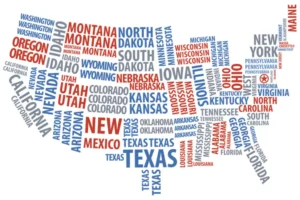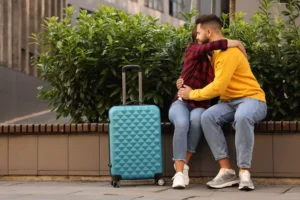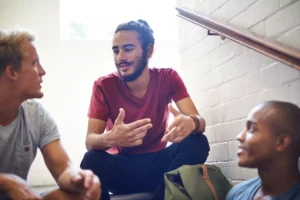Do you hear the children weeping,
Oh my brothers … the young children
Oh my brothers, they are weeping bitterly,
They are weeping in the playtime of the others.
– Elizabeth Barrett Browning
When I was a freshman in high school, I got a firsthand initiation into the world of urban violence. I was walking home when a group of teens from an “inner-city” school beat me up.
There was no robbery involved; it might have been a gang initiation — or just some guys looking for kicks. But within seconds after a tough-looking kid stepped onto the sidewalk in front of me, I was on the ground protecting my head under a rain of blows. Six or eight guys punched and kicked while I cried out “Please stop; please stop” over and over again.
Then in what I can only describe as an act of God, my old grade-school bus driver came by on her route. She radioed for help and my assailants scattered. Thanks to her, I escaped with only a black eye and bruises.
Of course, the emotional damage was a little harder to measure.
I walked away with a simple question: What made these kids turn to violence? My parents taught me to walk away. Jesus taught me to turn the other cheek. Those teens, on the other hand, beat up a freshman they’d never seen before to get their kicks. Why?
The police caught the oldest member of the gang a month later. He’d just turned 18, which meant he was tried as an adult and did three days in county jail. But there were times I wished he would rot in prison.
He stole part of my childhood, and only paid for it with 72 hours behind bars.
The Day Camp Bus
Several years later, my church started ministering in a public housing complex. In June 2001, we bused in kids from “The Projects” for our annual Vacation Bible School. My job was to ride along and monitor the students.
On the first day I took my charges to the playground. A fist-punching, rock-throwing, mud-slinging, face-slapping war began within 10 minutes. I think the ever-popular “Your Mama” jokes started it — but it didn’t end there.
“If you talk about my mama, I’ll hit you!”
“If you hit my cousin, I’ll kick you back!”
“Don’t kick my friend, or I’ll throw rocks at you!”
It took the combined forces of myself, the bus driver and another teacher to break up the melee. I counted my blessings that no one pulled a knife.
As I went home to lick my wounds and question my good intentions, I was left with the same question: What made grade schoolers turn to violence? I would never hit someone because he called me (or even my mama) a name. What happened to “those” kids?
Then I remembered the day I spent knocking on doors, inviting them to VBS. I recalled the group of young men standing on the street corner — smoking something besides tobacco in an area where drug deals were a way of life. I tried to ignore the mothers who berated and hit their children with the door wide open.
I recalled the crude sign that served as a memorial for a drive-by shooting victim, right in the middle of the neighborhood. (I’ve never seen a real gun except on the belt of a cop.) I pondered the music/TV/video game bombardment that greets kids before breakfast, and the toy weapons they play with so casually, and I thought about how this environment might bring out the worst in human nature.
Then I tried to look at my bus riders in a different light. By then, I’d seen them crying. Some would cling to me for a hug moments after they were throwing rocks, starved for a human touch and a kind word. Maybe they misbehaved to get the only one-on-one attention they’d find all day.
Unfortunately, I also began to see their futures. When I gazed into the face of Damien, the defiant, violent one, I saw the makings of a future high school dropout. I looked over to Carmen, bullied by the others, and saw a vulnerable teenage mother in place of first-grade tears. When I watched Mark push people around, I wondered if he would some day assault another high school freshman walking home from school alone, and shatter another family’s sense of safety.
Could I do any good at all in three hours a day for one week? Did I have any power to change the kids’ potential futures? Should I just go home and leave it to the “professionals”?
We hire police officers for a reason. It’s to lock people up when they start spreading the fear they’ve been learning all their lives, right?
Do You Hear the Children Weeping?
I finally had an answer to the question about my gang encounter in high school. “Those” kids resorted to fisticuffs because violence begets violence. But I was no closer to a solution.
I wish I could say our week of Vacation Bible School ended with nine professions of faith and a rousing sing-along of “Kumbayah.” Instead, on the last day, I had to physically tear several boys off Carmen, whom they were using as a punching bag. Damien was so upset I took away his target that he started hitting me.
So I drove home that day full of questions without answers. If I was raised in the same environment as Damien, would I beat up girls, too? Who was most to blame for his behavior — him, his absentee father and abusive mother, or his default role models in the world of gangster rap? How could I love Mark into a better life when I had to keep him away from the other kids? What could I do to help Carmen not grow into a baby-having-babies?
In the end, I wished I was back in the naïveté of my original question. I wished I still had no idea what caused a group of my peers to assault me (just for kicks) while I walked home from school one day. I wish I could have gone on in anger, wishing for bigger jails and harsher sentences. I wish I spent this week lobbying for victims’ rights; it might have been easier.
Instead, last Saturday I drove downtown to teach an acting class in our local homeless shelter — a place for grownups who never grew up; a place where adult Carmens and Damiens and Marks spend their days. In the middle of a noisy dining hall, I tried to help six souls discover communication skills, and maybe a little confidence in themselves.
Before that I worked for a year and a half in an urban ministry center, shooting pool with teens and trying to understand their world. Three summers, I’ve spent a week trying to share the love of Jesus in a VBS experience designed for hurting kids.
But I don’t serve in “rough” neighborhoods because I feel sorry for anybody — I’ve seen too much to throw pity parties. I lost my delusions of saving the world a long time ago. Yet I still go to the homeless shelter on Saturdays. Why?
It’s because when I listen very carefully in the middle of the acting exercises, it seems that I can hear the sound of children weeping. These not-quite-adults are weeping for what they’ll never have; weeping for what they might have been in another lifetime; weeping for someone to love them.
I don’t have the answers to all my questions about the cycle of abuse and violence. But one thing is certain: I cannot ignore that sound.
Copyright 2008 George Halitzka. All rights reserved.










